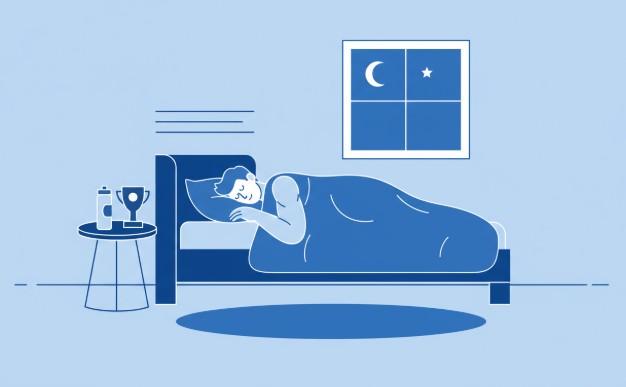6 Sleep Hacks That Improve Recovery and Muscle Growth
6 Sleep Hacks That Improve Recovery and Muscle Growth
Sleep often gets overshadowed by diet and exercise when it comes to recovery and muscle growth.
The truth is that quality sleep plays a pivotal role in any fitness regimen. It’s during the deep sleep stages that your body repairs tissues, builds muscle, and releases growth hormones vital for muscle recovery.
Despite this, many individuals struggle with obtaining the quality sleep necessary for optimal recovery and health. Luckily, various methods can help you maximize your sleep quality, facilitating better recuperation and enhancing your muscle growth. Here are six effective sleep hacks that can help you get the restful slumber needed to support your fitness goals.

Establish a Consistent Sleep Schedule
Creating a consistent sleep schedule is foundational for promoting better sleep. Going to bed and waking up at the same time every day helps regulate your body’s internal clock, making it easier for you to both fall asleep and wake up refreshed. This regularity is important since irregular sleep patterns can lead to chronic sleep deprivation, which negatively affects muscle & injury recovery.
However, even with a steady routine, some nights will still be hard to fall or stay asleep. On those nights, the best natural sleep supplements can lend a gentle hand while your schedule does the heavy lifting. Add a short wind-down, dim lights, quiet reading, and light stretches to nudge your body toward rest. If sleep stays patchy, shift bedtime in small steps and see how mornings feel.
Studies indicate that maintaining a consistent sleep pattern can enhance sleep quality by up to 60%. Start by determining the amount of sleep you need to feel rested. Most adults require between seven and nine hours of sleep per night. Stick to this schedule even on weekends to reinforce your body’s natural rhythm, keeping in mind that even minor variations can lead to increased grogginess the next day.
Create a Restful Sleep Environment
Your sleep environment can significantly affect your ability to fall asleep and stay asleep. The bedroom should be a sanctuary for rest, optimized to promote relaxation. Many experts recommend keeping the room cool, ideally between 60 to 67 degrees Fahrenheit, as this temperature helps facilitate deeper sleep.
- Consider investing in blackout curtains to block out any intrusive light.
- Light can inhibit the production of melatonin, the sleep hormone. Minimizing exposure is key.
Aside from darkness, noise levels can disrupt sleep.
Consider using white noise machines or earplugs to cover distracting sounds.
Keep your sleeping environment clutter-free to reduce stress and promote tranquility, allowing your body and mind to relax completely.
Limit Exposure to Blue Light
Exposure to blue light from screens can be a significant barrier to achieving quality sleep. The emitted blue light can interfere with melatonin production, tricking your brain into thinking it’s still daylight even when it’s time to sleep. Limiting screen time at least an hour before bed is advisable. As an alternative, if you find it difficult to unplug, consider using blue light glasses to mitigate the effects of digital screens. These glasses filter out blue light and can significantly improve your ability to fall asleep. By taking these proactive steps, you can positively influence your sleep quality.
Incorporate Relaxation Techniques
Incorporating relaxation techniques into your nightly routine can enhance sleep quality. Practices like meditation, deep breathing, or yoga before bed can help calm the mind and prepare the body for restful sleep. Research emphasizes that mindfulness practices can reduce stress and anxiety levels, making it much easier to transition into a restful state conducive to sleep.
Simply spending a few minutes each night focusing on breathing or engaging in mindfulness can lead to noticeable improvements in your sleep quality. Introduce these techniques gradually into your night routine to find what works best for you.

Trying progressive muscle relaxation, where you systematically tense and relax various muscle groups, can aid in fatigue and help signal to your body that it’s time to sleep. These calming practices prepare your body for sleep and help enhance recovery through improved blood flow and reduced muscle tension.
Monitor Diet and Caffeine Intake
What you consume in the hours leading up to bedtime can directly impact how well you sleep.
Heavy meals and spicy foods are more likely to disrupt sleep, causing discomfort that may keep you awake. (Aim to finish eating at least two to three hours before you turn in for the night.)
Be mindful of caffeine consumption. Even small amounts can lead to sleep disturbances. While caffeine can be great for boosting energy and athletic performance, its stimulating effects can linger for hours. To promote better sleep, switch to decaffeinated beverages later in the day and ensure you establish a calming pre-sleep routine that buffers the effects of caffeine.
Consider the hydration element of your diet.
While it’s good to stay hydrated, excessive fluid intake before bedtime can result in nighttime awakenings. Balancing these dietary factors is crucial for maximizing sleep and, consequently, muscle recovery and growth.
Engage in Regular Physical Activity
Exercise is a powerful tool for enhancing sleep quality. Engaging in regular physical activity can help regulate your sleep-wake cycle, allowing you to fall asleep faster and enjoy deeper sleep. Research shows that individuals who exercise regularly tend to get more restful sleep compared to sedentary people.
Timing your workouts is vital.
Exercising too close to bedtime can have the opposite effect on your sleep quality. Aim to have your workouts finished at least two to three hours before you plan to go to bed.
Exercise promotes better sleep and contributes to muscle growth by increasing growth hormone release during deep sleep. Finding the right balance of activity in your weekly routine can create a powerful synergy between muscle growth and quality rest. Aim for a blend of cardio and strength training, while prioritizing consistency, as regular activity reaps the most benefits.
Applying these sleep hacks can profoundly impact your recovery and muscle growth.
- Start by establishing a consistent sleep schedule, optimizing your sleeping environment, and limiting exposure to blue light with tools.
- Engaging in relaxation techniques, managing your diet, and incorporating regular exercise will transform your approach to recovery.
- Quality sleep is a vital piece in the puzzle of health.
- Rewarding your body with the time and conditions it needs for recovery will yield substantial results in your fitness journey.

